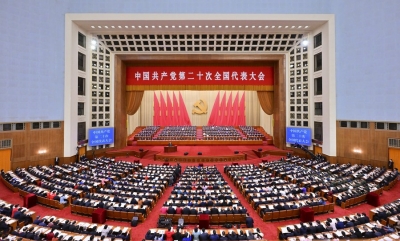
Gyeongju, Nov 2 (IANS) South Korean President Lee Jae Myung and Chinese President Xi Jinping agreed to make efforts to promote peace on the Korean Peninsula, National Security Adviser Wi Sung-lac said, as Seoul hopes Beijing will play a role to resume talks with Pyongyang.
Lee also asked Xi to play a “constructive” role for South Korea to seek peace and co-prosperity on the Korean Peninsula, Wi told reporters, after Lee welcomed Xi’s first visit to South Korea in 11 years to attend the Asia-Pacific Economic Cooperation summit held in the southeastern city of Gyeongju.
During the summit, Lee noted that high-level exchanges between North Korea and China have recently become more active, calling it a positive development that creates conditions for renewed engagement with Pyongyang, Yonhap news agency reported.
“I hope that the Republic of Korea and China will strengthen their strategic communication, make use of these conditions and work toward resuming dialogue with North Korea,” he said in his opening remarks, referring to South Korea’s official name. “It can never be overstated how important regional security is.”
On economic ties, Lee said bilateral economic cooperation has shifted from a “vertical structure” to a “horizontal one,” emphasizing the need to build a “mutually beneficial” relationship.
Xi said China values its relations with South Korea and will maintain policy consistency and stability, expressing Beijing’s willingness to deepen communication with Seoul.
“(China) is willing to deepen communication with South Korea and jointly address challenges, while promoting the stable and long-term development of the bilateral strategic relationship and contributing greater energy to peace and development in the region,” Xi said through a translator.
Xi described South Korea and China as “close neighbors who cannot move apart and inseparable partners in cooperation,” saying the two countries have achieved co-prosperity through sustained exchanges and collaboration.
“Promoting the healthy and stable development of China-South Korea relations has always been in the interests of both peoples and is a choice in line with the spirit of the times,” he said.
Following the summit, Lee said he and Xi agreed to work together in pursuit of peace, noting that the two countries share a common goal of promoting stability and prosperity.
“I and President Xi have agreed to move forward unwaveringly together on the path toward peace,” Lee said during a state dinner with Xi. “As our government works to open a new era of peaceful coexistence and shared growth, I expect that China will also play a constructive role in this process.”
On the sidelines of the talks, the governments of the two nations signed seven memorandums of understanding (MOUs) to broaden cooperation in practical areas.
The central banks of the two countries signed an agreement to renew their currency swap deal worth 70 trillion won (US$48.9 billion) for another five years.
The two sides also signed an MOU on strengthening exchanges and services and trade to make progress in negotiations to upgrade their free trade agreement.
Another agreement paved the way for cooperation between the two nations’ law enforcement agencies to collaborate on responses to voice phishing and online scam crimes.
Wi evaluated that the summit marked the “full restoration” of Seoul-Beijing ties achieved through the Lee administration’s “pragmatic” diplomacy centered on national interests.
During the talks, Lee outlined his government’s initiatives for the denuclearization of the Korean Peninsula and asked for Xi’s constructive efforts to help resume dialogue with North Korea. Xi, in turn, said China would continue its efforts to promote peace and stability on the peninsula, Wi told reporters.
“The two leaders shared the view that the US is the most important country to resume talks with North Korea,” Wi said.
The discussions also covered sensitive issues, including China’s recent sanctions on US subsidiaries of Korean shipbuilder Hanwha Ocean, which Beijing accused of cooperating with a US investigation into China’s maritime and shipbuilding industries.
“There were productive discussions regarding Hanwha Ocean, which is linked to the ongoing trade dispute between the US and China,” he said. “I sensed that if tensions between Washington and Beijing ease, Hanwha Ocean could also see productive progress in that atmosphere.”
Other points of contention, such as China’s installation of steel structures in overlapping areas of the Yellow Sea and Beijing’s restrictions on Korean cultural imports, were also discussed, Wi said, without elaborating on the details.
“Both sides shared the understanding that the issues needed to be resolved through continued communication,” he said.
–IANS
int/rs




